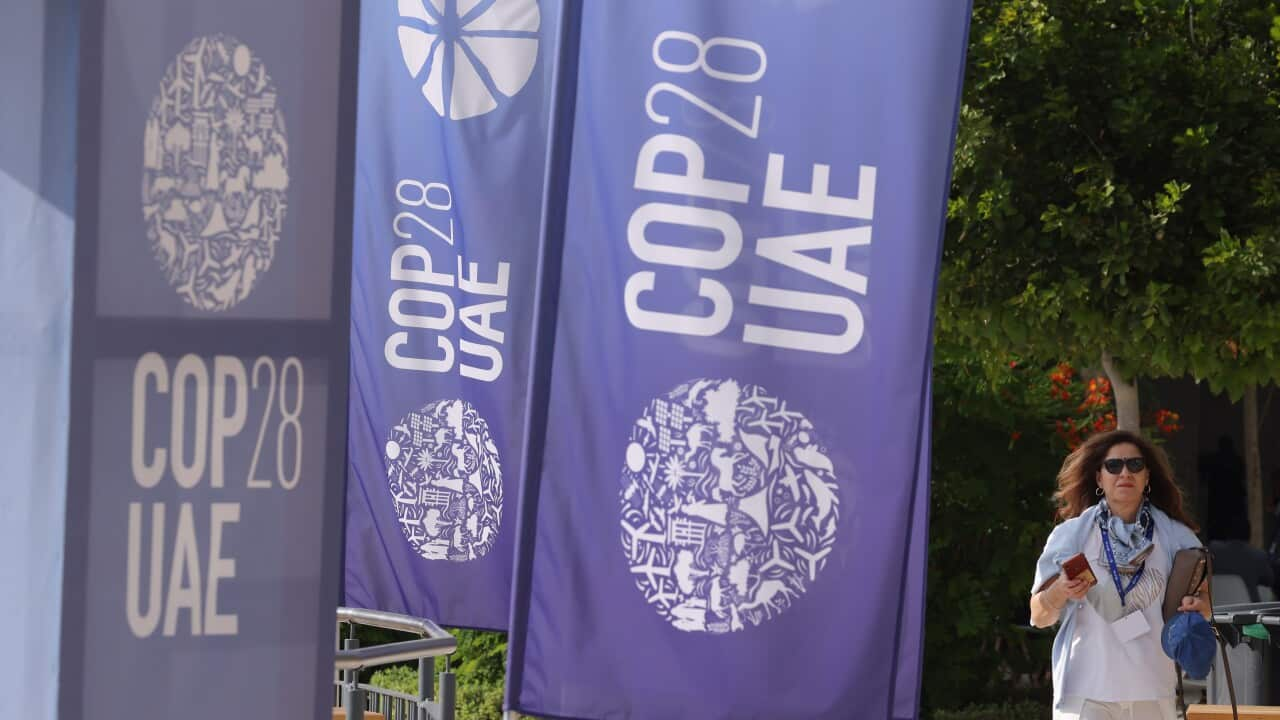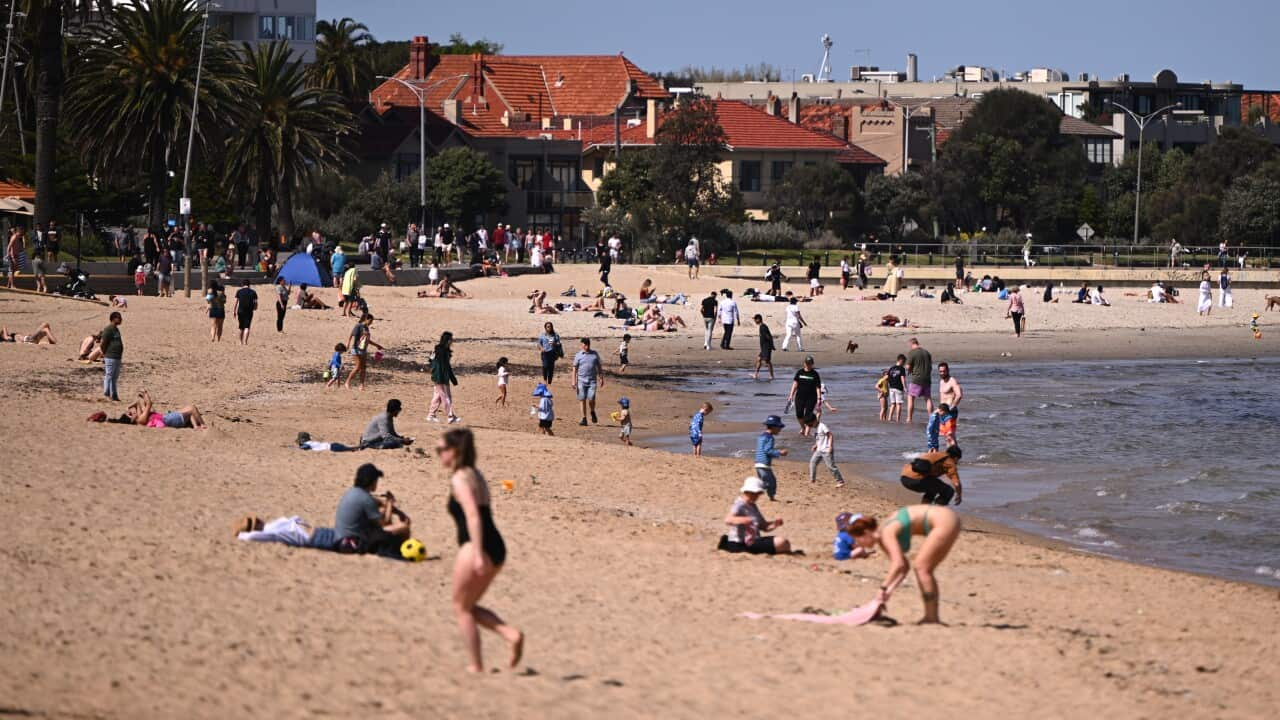Key Points
- Nations at COP28 have pledged over $400 million to a fund that will compensate climate-affected countries.
- The fund aims to assist nations struggling to cope with loss and damage caused by the climate crisis.
- While many welcomed the deal, some criticised it for not going far enough to "make a substantive difference".
Nations at the UN COP28 Climate Change Conference made a "historic" deal on Thursday, pledging more than $400 million to launch an unprecedented fund that aims to compensate the world’s most vulnerable countries for the impacts of climate change.
The fund has who find themselves on the frontlines of climate change, and who disproportionately suffer from increasingly frequent extreme weather events such as floods, drought and rising seas.
The agreement to finally launch the fund follows at annual UN climate meetings, and many were surprised by how quickly the deal was ultimately sealed and announced on Thursday, the first day of COP28.
Developed nations agreed to set up the fund but the process was waylaid over the intervening 12 months by disagreements about the rules, where the money should be located and who should pay.
"The speed at which we have done it has also been unique, phenomenal, and historic," COP28 president Sultan Ahmed Al Jaber said on Thursday.
The agreement was greeted with sustained applause on the conference floor.
Responses to the announcement globally, however, have been slightly more mixed – with some welcoming what they see as long overdue compensation for countries who will suffer most from climate change, and others criticising the fund for not going far enough.
Here's what we know.
What is the loss and damage fund?
Put simply, the loss and damage fund is a financial mechanism that aims to help compensate countries that are struggling to cope with the loss, damage and irreversible impacts caused by the climate crisis.
For example, the fund aims to ensure that key infrastructure damaged in floods and storms can be rebuilt or replaced more sustainably.
All developing countries "particularly vulnerable" to the effects of climate change will be eligible to benefit from the mechanism, although the definition of what exactly constitutes "vulnerable" is yet to be specified.
The fund is set to launch by 2024. For the first four years, it will be administered by the World Bank, a decision that has been controversial among some developing countries, who have concerns about what they say is the institution's high costs, slow procedures and US influence.
Human rights groups like Amnesty International have criticised the World Bank for having "at best, a mixed record on implementing human rights safeguards in its operations".
The fund will, however, have an independent board and a developing country representative will get a seat on that board.
Who’s contributing to the fund?
The fund is designed to receive contributions "from a wide variety of sources", but all of the money that's been pledged so far has come from international governments.
The United Arab Emirates and Germany are each expected to contribute $100 million to the fund, while the European Union committed to $245.39 million. Britain promised "at least" $51 million, the United States put up $17.5 million and Japan offered $10 million.
Joe Thwaites, senior advocate for international climate finance at the Natural Resources Defense Council (NRDC), said a number of international bodies, organisations and sectors could and should pitch in to bolster the fund, whose beneficiaries contribute the least to the climate crisis yet suffer its most severe impacts.
"Governments, the private sector, and innovative sources – such as levies on international shipping and aviation emissions – can all contribute to the fund. Fossil fuel companies that have done the most to drive the climate crisis should also contribute – and if they do not do so voluntarily, governments should compel them to," he said in a press release from NRDC.
Wealthy nations have also attempted to broaden the pool of donors that are expected to chip in, albeit with limited success.
While the text accompanying the loss and damage fund "urges" developed countries to contribute, other nations are only "encouraged" to contribute "on a voluntary basis". Developed nations eventually agreed to this language.
How has the fund's launch been received?
Prominent figures around the world welcomed the decision to rubber-stamp the loss and damage fund as a crucial and unprecedented step in the direction of climate justice.
UN Secretary-General António Guterres welcomed the announcement, describing the fund as "an essential tool for delivering climate justice".
He called on world leaders to "make generous contributions and get the fund and the climate conference started on a strong footing".
Shiva Gounden, Greenpeace Australia Pacific's head of Pacific, similarly celebrated it as "a vital first step towards ensuring communities facing climate harm get the support they desperately need".
"For too long, those least responsible for causing the climate crisis have borne the brunt of climate impacts," he said in a statement.
"We're seeing this play out across the Pacific in real time as sea level rise, severe storms and cyclones, and warming oceans threaten livelihoods, security, and the unique and irreplaceable Pacific culture."
"Now, the fund needs to be filled", he added, calling on nations like Australia, “the third-largest fossil fuel exporter in the world", to finance it.
Amnesty International was tempered in its response, describing the agreement as a "welcome step" but noting that "the financing pledges made today by a few countries fall far short of what is really required".
"The amount pledged initially is barely enough to get the fund running, and little more," Amnesty International's climate advisor Ann Harrison said in a statement.
"Billions of dollars are needed to make a substantive difference to communities in desperate need of help to rebuild homes after storms, or to support farmers when their crops are destroyed, or those permanently displaced by the climate crisis."
The relatively meagre contribution from the US, the world's largest economy and one of the biggest global contributors to CO2 emissions, drew immediate criticism.
Mohamed Adow, director of Power Shift Africa, called it "embarrassing". He also criticised the fund's lack of rigidity, suggesting that it currently lacks sufficient guardrails to ensure donors not only step up and pledge funding, but also follow through on their promises.
"Although rules have been agreed regarding how the fund will operate, there are no hard deadlines, no targets and countries are not obligated to pay into it," Adow said.
"The most pressing issue now is to get money flowing into the fund and to the people that need it."
A recent UN report estimated that by 2030 developing countries will collectively require up to $400 billion a year to adapt to climate-induced changes to people's lives, livelihoods, and cultures.












